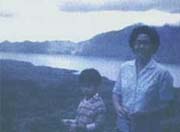| 
Mother/Land, the second in Ma’s Xin Lu project,
is a meditation on the separations and departures that have shaped
the maker's identity, his family, the city of Hong Kong where he
grew up, and the Chinese Diaspora in which he now wanders. This
experimental video takes off from a series of interviews Ma conducted
with his mother before and after her departure from Hong Kong in
1996. Her reflections on leaving the city that she has called home
for over sixty years, and her subsequent adjustment to living in
London forms the main narrative in the video. This event triggers
an exploration of other departures—such as Ma's own journey
back to the United States seventeen years ago, and the turnover
of Hong Kong from British to Chinese rule in 1997. The unconventional
relationship between Ma and his mother, defined by frequent separations
and reunions, is contrasted with both western and Chinese discourses
on motherhood, including Freudian and Lacanian psychoanalysis, (theories
centered around the separation of mother and infant) their feminist
revisions, and the classical Chinese texts Lie Nu Zhuan (The
Book of Virtuous Women) by Liu Xiang and Nu Jie (Admonitions
for Women) by Ban Zhao.
In exploring the use of motherhood as a metaphor in nationalism,
some of these texts link Ma's family stories back to recent events
in Chinese history. His alienation from and yearning for his family
extends to a cultural level in his manifold relationship to the
many Chinas - Mainland China, Hong Kong, Taiwan, and various overseas
Chinese communities. The visual strategy for this video, inspired
by ready-made jump cuts in Ma's super-8 home movies, parallels its
narrative leaps between voices, time, and geographical locations.
Faded film footage from the 1960s and '70s (filmed in Hong Kong)
is intercut with contemporary video interviews (videotaped in London)
and staged sequences (shot in Los Angeles). While the home movies
present images of a typical Chinese middle class upbringing, circa
1967-74, a deliberately created lesbian subtext in the video points
to other familial relations that are missing from the home movies.
This sense of loss is expressed both metaphorically in Ma's failed
attempt to re-create these missing scenes, and literally in a list
of items lost during his mother’s move to London. Mother/Land
portrays both the demise and dispersal of a traditional, heterosexual,
Chinese family, and the formation of new diasporic relationships
that are queer, trans-national, but no less Chinese.
Read more on Xin Lu Project
|




